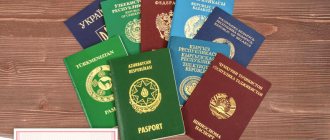The significant difference between a person's place of residence and temporary stay is the time during which he remains there. Place of residence is a permanent address at which a person has the right to reside for an unlimited number of years. He can be discharged only at his own request or in certain other cases.
A temporary stay is the actual location of a person, limited to a certain period of time. Usually this period is established by documents on the basis of which a citizen receives the right to reside in a certain place.
Legislation
Depending on these concepts, the legislation establishes various requirements for registration of citizens. For example, a person must be registered within 3 months if his stay in a given locality is planned for longer than 90 days.
Violations of this legislation are subject to administrative penalties. Moreover, it is imposed not only on the citizen who violated the registration procedure, but also on the owner of the home where the violator lived all this time. However, the owner’s guilt must be proven with documents.
For a violator of the registration procedure, the fine will be 1,500-2,000 rubles, and for the home owner - 2,000-2,500 rubles. Thus, the owner of the property should not prevent a person who legally lives in his apartment from obtaining temporary registration.
Comparison by documents and deadlines
The main differences between existing types of registration are the periods for which the opportunity to reside/stay in residential premises is provided, as well as the documents required to complete the procedure.
We can highlight the following list of documents that an individual needs when registering permanently at the place of actual residence:
- a document base;
- a document that identifies the applicant and is valid on the territory of the Russian Federation;
- statement.
Applications in form No. 6 for registration of a citizen of the Russian Federation at the place of residence
The foundation document is an agreement that confirms the citizen’s right to use a residential property at the address of which permanent registration is carried out.
Such living space could be:
- apartment;
- share of an apartment (for example, its room);
- a private house;
- part of the house;
- apartment-type dormitory;
- land plot.
In order to settle at the address of the land plot, another legal procedure must be carried out. This site must be documented as suitable for living due to the presence of the necessary conditions.
The listed residential properties do not necessarily have to be owned by the person who wishes to register in them. The receiving party may be another person, but he must give his consent to use this property.
That is why not only a purchase and sale agreement, but also a lease or social tenancy agreement can act as a basis document.
The identification document on the territory of Russia is a passport of a citizen of the Russian Federation. Foreigners must have a foreign passport for registration, but permanent registration is not allowed for persons without Russian citizenship.
A citizen can write an application for registration at the federal authorities or at home in advance if he downloads the form from the Internet.
The period within which a citizen is obliged to carry out permanent registration is a week from the moment he leaves his previous home. That is why, when registering permanently, a person must have an apartment or house in mind.
A citizen can obtain temporary registration in the following individual and collective residential buildings:
- accommodation facilities (hotels, hotels, motels, hostels, campsites, tourist centers and camps, sanatoriums, dispensaries, etc.);
- medical institutions;
- places of detention;
- apartment or part thereof;
- house or share of a private house;
- apartment-type dormitory.
In order to register at the address of an accommodation facility, a citizen will not need to formalize the procedure through federal authorities. He just needs to visit the selected hotel, provide the SP&R (reception and accommodation service) employee with his passport details and fill out the application form for accommodation.
Such registration is carried out in a few minutes, and payment for accommodation services is usually charged upon departure.
If a citizen was treated in a medical institution, or was forcibly transferred to a place of deprivation of liberty, then his temporary registration is handled by the management of these institutions.
To register at the address of an apartment, apartment-type dormitory or private house. You should visit the FMS (Federal Migration Service), write an application and provide the same package of documents as for permanent registration.
applications for registration at the place of residence
Temporary registration is issued by citizens who leave their actual place of residence for a period of more than 90 days. But for this they must move to another subject of the Russian Federation, otherwise the procedure is not required
. A person must apply for temporary registration a week after three months of spending time in another city.
Types of registration
Depending on the length of a person’s stay, there are different types of registration. Exists:
- temporary;
- constant.
For permanent residence, permanent registration is used. If a person is temporarily forced to move to another locality for a period of more than 90 days, then he must obtain a temporary registration.
However, the main registration is not cancelled. A master registration may only expire under certain circumstances other than lapse of time. A temporary one expires upon the expiration of the specific validity period for which it was issued. But it can be extended an unlimited number of times.
Permanent registration
Grounds for termination of the main registration can only be significant circumstances, such as:
- death of a registered person;
- filing an application for deregistration by the citizen himself;
- registration at a new address;
- if a person is declared missing by a court;
- in case of transfer of property rights to third parties for whom the registration of this person is an unnecessary burden;
- in some other cases provided for by law.
If a citizen resides permanently in an apartment, he or she must register there within 7 days. The legal grounds on which he can permanently reside at this address may be the following:
- The citizen is the owner of this property.
- A person lives at this address on the basis of a rental or rental agreement, as well as other types of transactions giving the right to reside.
- Due to the presence of family ties with the owners of the property.
To register on a permanent basis, a citizen must:
- Collect the necessary documentation.
- To write an application.
- Submit all documents to the registration authorities.
- Receive the result in the form of a stamp in your passport or in the form of a registration certificate if you do not have a passport (for minors).
The main documents that will need to be provided to obtain permanent registration are:
- personal passport of a citizen of the Russian Federation;
- title documents for housing, if available;
- consent of the owners in case of registration of a non-owner;
- permission from municipal authorities in the case of registering a person in municipal housing;
- certificate of the size of the family registered at this address;
- documents confirming family ties;
- application requesting registration.
Registration is carried out within 3 days. After accepting the papers, the registration authority employee will inform you of the date and time when you can receive your passport or certificate.
To register children if one of their parents is registered at this address, permission from the property owners and the municipality is not required.
Temporary registration
Based on documents confirming the actual temporary stay of a citizen in a given locality, a certificate of the established form 8 is issued, which is filled out on a special form. This form has a specific identification number, which is listed in the general migration database.
To obtain it, you must go through a similar algorithm as when obtaining permanent registration. Only deregistration will not be carried out at the place of permanent registration. The result of registration will be the issuance of a certificate.
This document has the following data:
- barcode and identification code in the left corner;
- the title of the document is in the middle of the document at the very top;
- certificate number in the upper right corner;
- personal information about who this document was issued to, as well as information about his date and place of birth;
- address of the person’s place of residence;
- validity period of this document;
- passport details of the citizen;
- name of the authority that issued this certificate;
- position and personal details of the official who signed the document;
- Federal Migration Service stamp and date of issue.
To obtain such documentary evidence of temporary registration, you need to collect the following documentation:
- personal passport;
- statement;
- papers giving grounds for legal residence in this residential premises;
- consent of the homeowner.
Once these documents are submitted, staff will officially notify the homeowner and their guest that the application has been received. If both confirm their agreement to temporarily register this applicant, the certificate will be issued within 3 days.
The concept of residence is the place of registration or residence
The place of residence of an individual is the actual address at which he permanently resides, which is legally assigned to him.
Having a registration record at the place of residence allows a citizen of the Russian Federation to use the following state services:
- queuing up for admission to kindergarten at the address of residence;
- admission to educational institutions at the place of residence;
- receiving social benefits (pensions, subsidies, etc.);
- receiving free medical care at a city clinic;
- official employment at the address of actual residence.
A particular advantage of having permanent registration is the last point, because many employers, when hiring a person, pay attention to the address of the citizen’s actual residence.
A person who lives and works in the same city, according to documents, is the most profitable employee. After all, he will be able to attend workdays without delay and work overtime in case of emergency.
Without a stamp in the passport certifying the registration of an individual, a person will only be able to receive free emergency medical care. The remaining treatment services can only be provided to him by private clinics that charge a fee.
Citizens who have not yet reached the age of majority must also have permanent or temporary registration. Mandatory registration of individuals applies to every person who, for one reason or another, resides in the territory of the Russian Federation
. This also applies to newborns.
But in this case, the official guardians or legal representatives of the child must take the lead in completing the procedure. This information is specified in Article No. 20 of the Civil Code of the Russian Federation
. For evading this obligation, citizens face administrative liability in the form of collection of a certain amount of money.
The place of residence of minors or newborn children is the permanent registration address of their parents. It is also possible to temporarily register children at a residential property if their legal representatives stay there for a limited period.
When an individual is absent from his permanent residence address for a year, he may be declared missing in court. And if he has not been declared at this address for a period of more than 5 years, then the court will recognize the individual as deceased.
But for the second option, the judicial authorities must have reason to believe that the citizen disappeared under circumstances that threaten his health and life.
Permanent registration is significantly different from temporary registration, so these concepts should not be confused. They have many documentary differences in design, timing, grounds, documents, etc.
What is the difference between registration at the place of residence and registration at the place of stay?
The place of residence is the place where a citizen permanently or primarily resides (Part 1 of Article 20 of the Civil Code of the Russian Federation). All persons permanently residing in the territory of the Russian Federation (citizens of the Russian Federation, stateless persons, foreign citizens) are subject to registration at the place of residence. Citizens who arrive for temporary residence in residential premises that are not their place of residence for a period of more than 10 days are required to contact the officials responsible for registration within 3 days from the date of arrival (excluding weekends and holidays).
Interesting: Documents at the registry office for registering a marriage with a foreigner in Russia
No. 713, registration at the place of stay was limited to 6 months. And only in the event of a serious illness of the registered or close relatives themselves, as well as in the event of other extenuating circumstances, the period of stay could be extended. By decision of the Constitutional Court of the Russian Federation on 02.02.98 No. 4-P, such a restriction was recognized as inconsistent with the Constitution of the Russian Federation. Now all refusals to renew registration have no legal force.
Difference between place of residence and place of stay
As in the case of temporary registration, registration of registration must be carried out on the basis of certain official documents. In this case, these may be a certificate of ownership (or an act of acceptance of housing - if we are talking about a new building) or, again, the consent of the owner of the residential premises to register registration in the name of another person.
To register at the place of residence, a person must have legal grounds for being in a residential premises - for example, a lease agreement or the consent of the owner to carry out this procedure. In principle, a person has the right to register at the place of residence and in his own apartment - if it is located in another city and the citizen needs to stay there for more than 90 days.
Interesting: How to Divide Bills for Utilities in a Municipal Apartment
The main differences between the place of residence and the place of registration
Temporary residential facilities include recreation centers, health institutions, camps, hotels, sanatoriums, and rental housing. Employees of public institutions (sanatoriums, hotels) register guests themselves; in other cases, the person must notify them about their stay.
The place of stay, as mentioned above, is a residential premises where a person temporarily lives for a period established by law. At the same time, the law clearly states which institutions are considered temporary locations: sanatoriums, rest homes, bases, campsites, and so on.
12 Aug 2020 glavurist 119
Share this post
Related Posts
Tip 1: What is the difference between residential address and registered address?
There are three types of addresses in circulation – legal, actual and postal. All of them are actively used by firms and enterprises of various purposes and sizes. Should the actual address be the same as the postal address? How to formalize them correctly so as not to have problems with the law?
The actual address may be the legal address at which the individual entrepreneur is registered. Both the main office and production sites have the right to be located there. The legislation assumes that at the actual address you can find either a representative of the enterprise or the place where the products are manufactured.
Interesting: A student studies at a university receiving a scholarship of 120 rubles and drops out of school
Difference between place of residence and place of stay
Place of stay. This is a residential or non-residential premises where a citizen stays temporarily. Law of the Russian Federation dated June 25, 1993 N 5242-1 (as amended on November 28, 2020) “On the right of citizens of the Russian Federation to freedom of movement, choice of place of stay and residence within the Russian Federation” gives a broad explanation of the concept and contains a specific listing of premises that can be refer to the place of stay.
- To register in municipal housing, it is necessary to obtain the consent of all those registered. Moreover, the submitted documents will go to a special commission, where the owner of the residential premises (for example, the city) will make a decision on the possibility of registration in this residential premises of the citizen.
- To register at the place of residence in owned housing, the consent of all co-owners is required. But the consent of the remaining registered persons who are not the owners is not required.
About minors separately Registration of minor children at the place of stay or at the place of residence of parents (adoptive parents, guardians) is carried out regardless of the consent of the owners, tenants and members of their families. Thus, if a citizen of the Russian Federation is temporarily registered in your living space, then he can register his child with you without asking anyone’s consent. Documents required for temporary registration of a minor child under 16 years of age with a parent:
What is the difference between place of residence and place of registration?
- Preparation and provision of documents identifying the child’s identity. Up to the age of 16 , when registering temporarily, a child provides a passport of the parent/legal representative and a birth certificate for the minor. It is with the help of the latter document that a citizen can prove his relationship.
- Submitting an application for registration of children. You should be wary of the requirement of passport offices to provide owner consent to perform registration actions, because This requirement in relation to children is unlawful.
- A frequent requirement of organizations accepting documents is the consent of the second parent to register the child with the second parent.
- Permanent registration is reflected in the civil passport in the form of a corresponding mark on strictly designated pages.
- Permanent registration is provided for an indefinite period.
- Having permanent registration does not mean that a citizen is obligated to permanently reside at the address indicated in the passport.
- Temporary registration is used to record persons temporarily staying at a specified address by government agencies.
- If a citizen does not live at the temporary registration address, he must notify the registration authorities. Otherwise, we are talking about breaking the law.
- Unlike permanent registration, which requires the presence of a residential premises, the list of real estate at the address of which temporary registration can be obtained is much wider.
Interesting: Sample application for alimony in marriage for a second child









